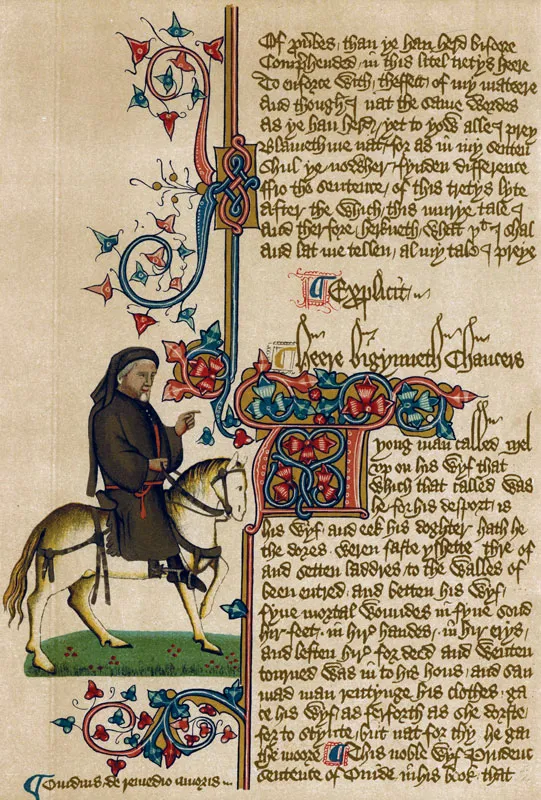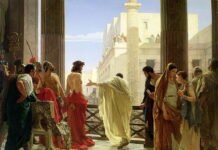A Freedom of Information request has exposed the University of Nottingham for issuing trigger warnings to students who have signed up to a module on medieval English literature.
Four authors apparently presented those of a delicate or sensitive disposition with particular threats that required forewarning: Geoffrey Chaucer, William Langland, John Gower, and Thomas Hoccleve. But what was it that was so dangerous about these poets that required a trigger warning? Two generalities and something very specific: violence, mental illness and, rather more chillingly, expressions of Christian faith.
More people will have read Chaucer than Langland or Hoccleve. And they will know that although Chaucer gets a little bawdy, much to the delight of those who study him as teenagers, there is not much more violence, mental illness (or bawdiness, which seems less of a problem) than you get in some pubs on a Friday night near closing time.
But a trigger warning about Christian faith?
This is an act of ambitious scale. Perhaps as ambitious as it is ignorant and ill-willed.
The best image to describe this might be of a man high up on a tree sawing off the branch on which he is perched, oblivious of its connection to the tree.
The Middle Ages were Christian. Their music, culture, the cathedrals, the literature were Christian. Perhaps it might occur even to woke academic trigger-happy hack that the university he or she is sniping from is itself a successor of a concept that was creation of the Catholic Church?
The world of Chaucer and Langland was interlaced with monasteries and cathedral schools. The monks cared so passionately about truth and knowledge that they had gathered and guarded all the literature that there was to be found. What they guarded they copied. What they copied they studied. And confident that that the God they worshipped had created a universe that was coherent, trustworthy, real and readable, they provided the platform for the intellectual exploration that laid the foundations for the coming scientific revolution.
The Church’s role in learning, teaching, gathering and preserving literature was unique. The Church was also a major patron of practical skills like engineering as it constructed the elaborate cathedrals, which have turned out to be among the most beautiful and inspirational buildings known to man. The Church developed the most exquisite polyphonic music.
Those who held the Christian belief, of which the Nottingham bureaucrats appear so scared, developed the scientific method and fueled the birth of science and technology.
Catholic scientists, inspired and driven by their Christian faith, pioneered discovery after discovery. The Society of Jesus has been particularly active, notably in astronomy (35 craters of the moon are named after Jesuits).
Most areas of science and knowledge owe their development to the Catholic enquiring mind. They included in the area of astronomy. For heliocentrism there is Nicolaus Copernicus; for acoustics, Mersenne; mineralogy, Agricola; modern anatomy, Vesalius; chemistry, Lavoisier; and more recently with evolution, Lamarck. For genetics there was Mendel; the big bang cosmological theory, Lemaitre; atomic theory, Boscovitch; and bacteriology, Kircher and Pasteur.
The university was a Catholic idea. The name came from ‘Universitas magistrorum et scholarium’, which approximately means “community of teachers and scholar”. The universities grew out of Cathedral schools and monastic schools: Bologna 1088, Oxford 1096, Salamanca 1134, Paris 1150, Cambridge 1209, Montpellier, 1220, Padua 1222, and so on and so on …
It’s more than likely that the Eng. Lit. ‘academic’ or the woke uni administrator who couldn’t sufficiently restrain their Christianophobia knows nothing of any of this. Perhaps they just fear and dislike Christian ethics and the prospect of living lives of moral accountability?
Fr David Palmer, Catholic chaplain to the University of Nottingham and its Catholic Society, issued a strongly worded protest.
“(This) sends a deeply concerning message to all students that Christian beliefs – which are central not only to many university students but also to the intellectual and cultural foundations of English history – are somehow offensive or harmful to others.
“To single out Christian perspectives this way is to dismiss the vital role that Christianity has played in shaping this country’s literature, philosophy and society.
“To reduce these themes to something that requires a trigger warning marginalises the beliefs of many students – and creates an environment of division, rather than of dialogue.
“The University of Nottingham should allow for students to engage with various worldviews and grapple with them with respect and thoughtfulness. The implications that Christian values are uniquely problematic is a severe form of discrimination that has no place in academia.”
Fr Palmer observed that “our institutions have been taken over by small minded lemmings in thrall to nonsense…”
Frank Furedi, emeritus professor of sociology at the University of Kent, said: “The problem is not would-be student readers of Chaucer but virtue-signaling, ignorant academics.”
It may however be a bit more serious than that. One trigger warning doth not a persecution make. But the catch-all warning that the Christian faith itself can be triggering serves as yet one more wake-up call that the Left, secular, woke. progressive people who have, as they threatened to do, “marched through the institutions”, have nothing less in their sights than the Catholic Church.
Fr Palmer and the Catholic Society of Nottingham University are to be congratulated for their energetic and dismissive repudiation of the university’s ignorance and bigotry. But the battle has not been won and the war – a war with a movement that entertains only slightly disguised totalitarian ambitions – is being slowly and painfully lost.
Yet this is an old struggle and the Church has won it before. And those who actually read Langland in Piers Ploughman will discover that: “The man who tells the truth to those in power is condemned first … and none are more easily seduced from the right beliefs than clever scholars who study a lot of books.”
Perhaps the deepest encouragement comes from Langland’s vision of the final victory of good over evil:
“Your lying, Lucifer, has lost us our prey:
When we followed you first, we fell from heaven,
Believing your lies, all leaping together,
And your latest lie has lost us Adam
And our lordship, I believe, over land and water:
Now shall the prince of this world be cast out.”
The light said again to Lucifer, “Unlock.”
“What lord says unlock?” called Lucifer. “Who are you?”
“The King of Glory,” came back the cry,
“The Master of Might and all manner of Virtues,
So dukes of this dungeon undo these gates,
And hail the Christ, son of heaven’s King!”
With that hell broke, and Belial’s bars.”
No wonder they are worried about what might happen to their students if this is both read and understood.



